Book contents
- Frontmatter
- Contents
- List of figures and tables
- Preface
- 1 Imaginative Criminologies of Space: the Spaces of Imaginative Criminology
- 2 Historical Spaces of Confinement 1: Homes for Indigenous Children in Australia
- 3 Historical Spaces of Confinement 2: Magdalene Laundries
- 4 Creative Writing and the Imagined Spaces of Imprisonment
- 5 Border Spaces and Places: the Age of the Camps
- 6 Imagining Spaces of Violence and Transgression in Vancouver and Northern Ireland
- 7 Imagining Dystopian Futures in Young Adult Fiction
- 8 Conclusion
- References
- Index
6 - Imagining Spaces of Violence and Transgression in Vancouver and Northern Ireland
Published online by Cambridge University Press: 30 April 2022
- Frontmatter
- Contents
- List of figures and tables
- Preface
- 1 Imaginative Criminologies of Space: the Spaces of Imaginative Criminology
- 2 Historical Spaces of Confinement 1: Homes for Indigenous Children in Australia
- 3 Historical Spaces of Confinement 2: Magdalene Laundries
- 4 Creative Writing and the Imagined Spaces of Imprisonment
- 5 Border Spaces and Places: the Age of the Camps
- 6 Imagining Spaces of Violence and Transgression in Vancouver and Northern Ireland
- 7 Imagining Dystopian Futures in Young Adult Fiction
- 8 Conclusion
- References
- Index
Summary
In Chapter 5 we discussed responses to migration across four distinct regimes; the making of liminal in-between spaces in the form of camps for the displaced, in Bauman's terms ‘human waste’; and the usefulness of a threefold analysis of space through the relational, embodied and imagined experiences of migrants. In Chapter 6 we build on this analysis by examining the social dynamics and the visual and material culture of urban space as well as the embodied, relational and imagined/lived experience of public space in two cities, Vancouver, Canada and Belfast, Northern Ireland. We focus specifically on two areas of each city, the Downtown Eastside (DTES) in Vancouver, also known as ‘skid row’, and central and central/north Belfast, where the ‘peace lines’ and ‘peace walls’ separate, demarcate and act as borders between two communities of Belfast's citizens.
In Chapter 6 we focus specifically on the issue of space, place, violence and transgression, drawing on these two case studies in Vancouver and Belfast. ‘Imagining spaces of violence and transgression in Vancouver and Northern Ireland’ focuses first of all on the lives of indigenous women and sex workers in Vancouver's DTES and then explores the ‘architecture of conflict’ in the ‘peace walls’, ‘peace lines’ or ‘border lines’ in Belfast in the context of spaces of war, violence and conflict. For 26 years on 14 February, Valentine's Day, women of the DTES have led a Memorial March through the city, stopping at the places and spaces where women were murdered or went missing. We draw on material from walking methods, photographs and interviews with women who attended the march in 2016 to examine spaces of past, present and future in their lives. Arts-based walking methods are also utilised that explore the peace walls, peace lines and interfaces as border spaces through sensory multi-modal research.
We suggest, drawing on Ash Amin's work, that the ‘convivial commons’ we experienced walking with residents in the Downtown Eastside of Vancouver and Belfast offers a good example of what might be called on the one hand a ‘successful public space’ with various opportunities to participate in communal activity (Amin, 2006: 1), despite the media messages and public perceptions about the two sites, particularly the DTES. On the other hand, however, the material impact of poverty, austerity, violence (and sectarianism in Belfast) complicates this, with the impact of poverty more visually apparent in the DTES.
- Type
- Chapter
- Information
- Imaginative CriminologyOf Spaces Past, Present and Future, pp. 93 - 116Publisher: Bristol University PressPrint publication year: 2019



